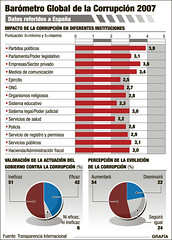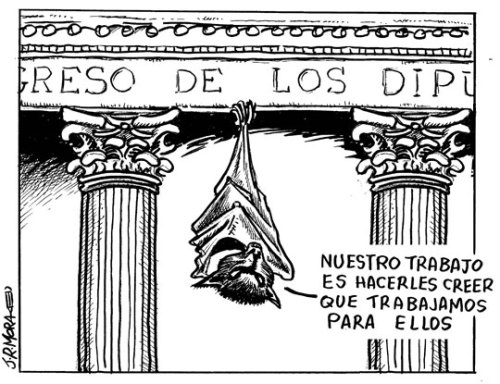Publicado en The Economist:
A socialist prime minister pursues liberal reforms
HAS Spain changed at last? The prime minister, José Luis Rodríguez Zapatero, who is mistrusted by the bond markets and unpopular with Spaniards, would certainly like the world to think so. On February 2nd he signed a solemn “social pact” with unions and employers, covering pensions, collective bargaining and more. It was, Mr Zapatero declared, the most important such deal since the Moncloa pact of 33 years ago. Under its terms Spaniards will, albeit with many exceptions, retire at 67 (instead of 65). Or at least they will do so in 2027, the year when the reform fully kicks in. That is far off, but Spaniards are set to be among the longest-working people in the European Union. First, however, they must find jobs. Unemployment at over 20% and rising is proof that Spain urgently needs a lot more change. The pact came just a day before the German chancellor, Angela Merkel, who many think is holding Mr Zapatero’s nose to the grindstone, was expected in Madrid. The hope was that she would return home to reassure Germans that Spain is not like giddy Greece, irresponsible Ireland or profligate Portugal, but a serious, austere, hard-working southern country that is ready to pop the pill of reform. The new pact has left some important problems unsolved. A crucial reform to collective bargaining will not be settled until mid-March. In an interview Mr Zapatero himself points to the madness in the current system, under which Spain combined one of the euro zone’s highest wage rises with some of its biggest job losses in 2009. Now he wants wage agreements linked directly to productivity growth.If the Germans believe this, Mrs Merkel will find it easier to agree with her fellow euro-zone leaders to an expanded rescue fund at next month’s EU summit. A bigger fund (and the social pact) should soften worries about Spanish sovereign debt, at least for the time being. Meanwhile Spain’s shakier savings banks have been set on a path to recapitalisation and, in some cases, nationalisation by September (see article). Yet it remains to be seen if all this will be enough to restore confidence in growth for a country that accounts for almost one-third of the euro zone’s unemployed. The prime minister’s belated conversion to reform is so earnest that, with or without prodding from Mrs Merkel and her fellow euro-zone leaders, he now insists that he would pursue it anyway. “Spain is doing its reform on its own, not because anyone is telling us to,” he says. “I am in favour of sanctions being imposed on EU countries that do not comply with debt and deficit criteria.” Mr Zapatero also remains committed to Spain’s fiscal consolidation. He says that the government narrowly beat its 2010 deficit target of 9.3% of GDP. A contraction of GDP of 0.2% was also a shade better than forecast. He insists that he will meet 2011 targets of a 6% deficit and 1.3% growth. But if the growth does not come, he will not tax his way out. “If there was any risk of not meeting the target, then we would do it by reducing spending, not by increasing taxes,” he vows. There are limits, however, to his reformist zeal. Mr Zapatero preaches wage moderation (and real wages are indeed dropping at last), but he does not embrace the idea that Spain as a whole needs wage deflation to compete. “Not necessarily,” he says. “There has to be salary moderation. I think we have to look at it on a sector-by-sector basis and a company-by-company basis.” Nor does he believe that house prices have much further to fall. “We are almost at the bottom (of the cycle),” he insists. Many would disagree. Although 700,000 new homes remain unsold, house prices have fallen by only 13%. And what about growth? Famously optimistic, Mr Zapatero points to studies suggesting that Spain will grow faster than the EU average as early as 2013. But elections are due next year, and polls suggest that his Socialist party will no longer be in charge. Reform has come too late. from PRINT EDITION | Europe
















No hay comentarios:
Publicar un comentario